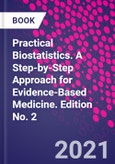Practical Biostatistics: A Step-by-Step Approach for Evidence-Based Medicine, Second Edition presents a complete resource of biostatistical knowledge meant for health sciences students, researchers and health care professionals. The book's content covers the investigator's hypothesis, collective health, observational studies, the biostatistics of intervention studies, clinical trials and additional concepts. Chapters are written in a didactic way, making them easier to comprehend by readers with little or no background on statistics. Evidence-based medicine aims to apply the best available evidence gained from the scientific method to medical decision-making using statistical analyses of scientific methods and outcomes to drive further experimentation and diagnosis.
With a detailed outline of implementation steps complemented by a review of important topics, this book can be used as a quick reference or hands-on guide on how to effectively incorporate biostatistics in clinical trials and research projects.
Please Note: This is an On Demand product, delivery may take up to 11 working days after payment has been received.
Table of Contents
Part 1: The Investigator's Hypothesis
1. Investigator's Hypothesis and Expression of its Corresponding Outcome
Part 2: Collective Health
2. Disease Frequency Measures
3. Health Indicators
4. Epidemiological Studies
5. Pharmacoeconomics
Part 3: Observational Studies
6. Basic Concepts in Observational Studies
7. Determination of Association Strength Between an Exposure Factor and an Event in Observational Studies
8. Increasing Accuracy in Observational Studies
Part 4: Biostatistics of Intervention Studies
The Clinical Trials
9. The Intervention Studies
10. N Estimation and N Assessment of�a Published Trial
11. Organization of Variables and Endpoints
12. Measures for Results Expression of�a Clinical Trial
13. Determination of Normality or Non-Normality of Data Distribution
14. Hypothesis Testing
15. Correlating Sample Data with the General Population
95% Confidence Interval Summarizing the Steps
Part 5: Additional Concepts in Biostatistics
16. Individual and Collective Benefit and Risk Indexes Inferable from Intervention Studies
17. Statistical Assessment of Diagnostic Tests for the Clinic
18. Systematic Reviews and Meta-Analyses
19. Correlation and Regression
20. Per Protocol Analysis and Intention-to-Treat Analysis
Authors
Mendel Suchmacher Carlos Chagas Institute of Medical Graduation; Teresopolis University Medical School - UNIFESO; Genodermatoses Sector of the Clinical Genetics Service, Federal University of Rio de Janeiro, Brazil. Mendel Suchmacher, MD, MSc, graduated in Pharmaceutical Medicine at Federal University of the State of S�o Paulo, is Board Certified in Internal Medicine and Hematology-Hemotherapy and member of the American College of Physicians. He holds teaching and research positions at prestigious Brazilian institutions: Professor of Clinical Immunology at Carlos Chagas Institute of Medical Graduation; Professor & Chairman of Microbiology and Immunology, and Research Fellow at Teresopolis University Medical School - UNIFESO; Professor & Coordinator of the Genodermatoses Sector of the Clinical Genetics Service at Federal University of Rio de Janeiro. Additionally, he is member of the clinical staff of Hospital Israelita Albert Einstein. Mauro Geller MD degree, Teresopolis University Medical SchoolPhD, Clinical Medicine, Federal University of Rio de Janeiro
Post-doc, Immunogenetics, Harvard University. Mauro Geller, MD, PhD, holds an MD degree from Teresopolis University Medical School, a PhD in Clinical Medicine from Federal University of Rio de Janeiro, and a Post-doc in Immunogenetics from Harvard University. He has extensive experience in the field of clinical immunology, especially in the areas of clinical medicine, tumoral immunology, genetics and immunodiagnostics. Dr. Geller is founding member and current medical director of the Brazilian National Neurofibromatosis Center; fellow of the American College of Physicians and of the Royal Society of Medicine; member of the European Society of Gene Therapy; and member of the Brazilian Societies of Immunology, Microbiology and Genetics. He is Board Certified in Internal Medicine, Immunology, Allergy and Public Health. Dr. Geller also has extensive experience with research in the areas of immunology, microbiology and genetics, as well as with clinical research, and has published 137 papers, 8 book chapters, and 4 books. He also serves as ad hoc advisor to the Brazilian National Institute of Health (ANVISA) and is member of the clinical staff of Hospital Israelita Albert Einstein.








